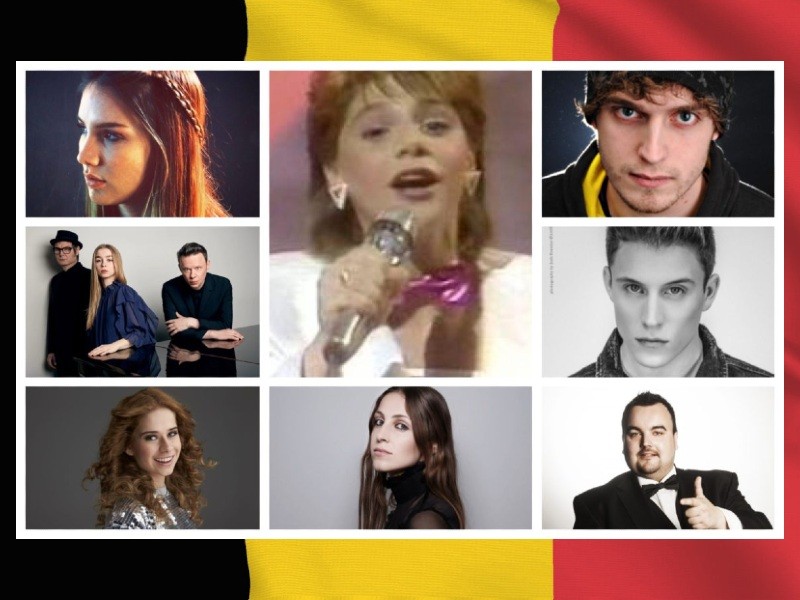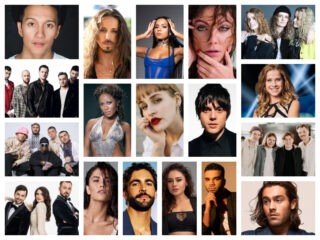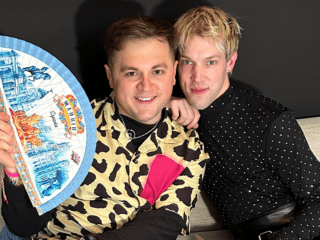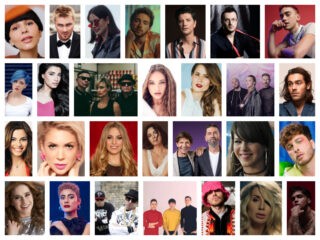It’s a Happy National Day to Belgium! In 1830, Belgium regained its independence from The Netherlands and on the 21 July we celebrate that — and the installation of the first Belgian king.
This young nation has been a member of the EBU since the beginning of Eurovision. However, Belgium has always been a bit of a complicated matter. So, on this 21st of July, we explain everything you need to know about Belgium in Eurovision and take down some of the persistent myths and misunderstandings about its participation.
So grab your waffles and a Belgian beer, while we enjoy a little tour of Belgium at ESC.
FAQs: All your questions about Belgium at Eurovision answered
1. Two Belgian broadcasters, but one country participating?
Belgium participates as one country at Eurovision. However, the participation itself is organised by the broadcasters of two different regions: Wallonia and Flanders. That’s partly because there is not one national broadcaster for the entire nation. VRT is the broadcaster that creates television content for the Flemish-speaking region called Flanders. RTBF is the broadcaster for Wallonia, the French-speaking region.
VRT and RTBF take turns selecting a Eurovision candidate for Belgium. Until 2020, when Eurovision was cancelled, VRT has overseen the even years (2014, 2016, 2018…) while RTBF has taken the odd years (2015, 2017, 2019…).
2. What about the German-speaking region? And Brussels?
Belgium also has a German-speaking region known as Ostbelgien. Besides that, Brussels has its own government and can be considered a region of its own. The German-speaking region and Brussels are, however, considerably smaller than Wallonia and Flanders. To give you some numbers on that:
- Brussels: 1.2 million inhabitants
- Flanders: 6.6 million inhabitants
- German-speaking region: 77,000 inhabitants
- Wallonia: 3.6 million inhabitants
These two regions have their own broadcasters as well. So, in theory, they could become EBU members and participate in some way. But as smaller regions, they simply don’t have the interest nor capacity to participate in the song contest.
Also: Consider the financial impact if they ever won Eurovision. The smaller German-speaking broadcaster Belgischer Rundfunk (BRF) could not bear this. Brussels has Bruzz, BX1 and VivaBruxelles (although, VivaBruxxelles is actually an RTBF channel). But these are also relatively small in comparison to VRT and RTBF.
3. Why do RTBF and VRT take turns?
Taking turns is the most convenient way to organise the sharing agreement. Both broadcasters have full freedom and ownership during their year at the helm. And they don’t have any accountability towards the other. Take into account that both regions have a different musical preference. What one region might consider a good Eurovision entry, might not be the case in the other region. This is one reason the two regions have separate musical charts. Flanders and Wallonia each have their own Ultratop, the hit-list for best-selling singles.
4. Do RTBF and VRT work together?
Some people tend to believe that VRT and RTBF don’t talk to each other and refuse to cooperate. This is not the case. Media outlets from both regions are welcomed at Eurovision press events hosted by each broadcaster. Luckily, the Eurovision press never has to travel to a different location: VRT and RTBF are actually based in the same building in Brussels. They do have separate entrances and exits, though. We’ve been guilty of forgetting that when we’ve entered the building and have at times stood at the RTBF entrance in a VRT Eurovision year. But that’s just a small inconvenience.
Next to attending the other’s Eurovision press events, the broadcasters also talk with each other about more important matters. The most recent example is Hooverphonic. The band from Flanders was internally selected to participate for Belgium in Rotterdam. And we all know what happened to Eurovision 2020.
The cancellation presented Belgium with a practical problem. With VRT taking the even years and RTBF the uneven years, it would actually have been the RTBF’s turn next year.
Normally, this would mean either RTBF would have to send Hooverphonic or that Hooverphonic would have to sit a year out to finally get their moment at Eurovision. Or they could just not participate at all. The broadcasters came together and decided there was a better way. RTBF agreed to sit 2021 out, giving VRT and Hooverphonic their moment.
So as of 2020 turns have been switched. RTBF will now oversee the even years, and VRT the odd years. A broadcaster willingly giving up its turn to let the other broadcaster shine another year. Isn’t that the type of love Eurovision is all about?
5. Can the broadcasters select artists from outside their region?
It’s often assumed that Belgium’s broadcasters will only select artists from their own region. This is not correct. The broadcasters can select whoever they want, even someone from outside their region.
This has already happened. In 2014, Axel Hirsoux participated in Eurosong — the Flemish national final from VRT. Axel is from Wallonia and French-speaking. Axel won the Flemish national final. In fact, the Flemish televote handed him an amazing 57.31% of the votes. And so Axel — a French-speaking Wallonian — went to Eurovision for the Flemish broadcaster. And he had the Flemish audience to thank for that.
6. What if Axel Hirsoux had won Eurovision?
7. But where are we going if Belgium wins?
8. So what happened when Sandra Kim won in 1986?
Sandra Kim stole European hearts in Bergen, Norway, winning Eurovision 1986 with “J’aime la vie”. Not prepared for this, Belgium and the broadcasters were suddenly faced with a lot of questions. Who needed to organise Eurovision? Sandra was sent by the Wallonian RTBF. But 1987 would normally be a “VRT year”. The broadcasters decided at first to organise Eurovision together. But practical problems and differences in vision between the broadcasters made this difficult. So RTBF — which sent Sandra in the first place — organised the Eurovision Song Contest alone in 1987 and choose to do so in Brussels. The Wallonian region didn’t have a suitable venue, so they went elsewhere.
Long story short: The question where Eurovision would be held in case of a win of Belgium is something that is better answered when it actually happens. However, the general consensus seems to be that the broadcaster which sent the winning artist should organise the following Eurovision. If RTBF sends a winning artist, perhaps it will be held in Wallonia. If VRT sends a winning artist, then perhaps it will be held in Flanders. However, Brussels is also still an option. And in the end, it doesn’t matter.
Belgium participates in Eurovision as one country. And in case it ever wins again, we will find a solution for whatever problems and questions occur then. As one country.











I’d be curious to know why the French-speaking side has tended to have the stronger entries. The good results from 2013, 2015 and 2017 all came from RTBF, as did Belgium’s only win in 1987 and its near miss in 2003. Other strong Belgium performances from longer ago in 1978 and 1984 came from RTBF too.
The duality could be also traced in language used – French with RTBF and Dutch with VRT. I always thought that ESC 1987 was organised by VRT because “Soldiers of Love” by Lilliane St-Pier were performed in Dutch, excluding the title. Thanks for the trivia.
Question, if let’s say RTBF wins, they host Eurovision the following year. Does taking turns continue? Does VRT get to pick an entry even tho RTBF is hosting the contest?
I guess that’s right.
It really depends on what is decided in case it happens again. in ’86-’87, the intention was for a long time to host it together, but there was no agreement on the venue or the budget, so eventually, VRT pulled out. It’s not written in stone that that would be the scenario again. Because the RTBF eventually organised the show alone, there was almost no room for the flemish community in it. If opportunity rises again to organise a big international event in Belgium, also the Flemish government will throw in some euros to get a bit of time in… Read more »
For meVRT send better song than RTBF
My TOP 7
1.1986
2.1983
3.1981
4.1982
5.1987
6.1988
7.2006
So much overrated in 1978,1984,1998,2003, 2017 (live version is not good)
So underrated 1983,1988,1973,1981…
First and only time in history in 1986, we had that host broadcaster of Eurovision didn t have song in contest.
You mean 1987? When RTBF hosted but didn’t enter a song.
My ranking of Belgium at Eurovision: Sanomi (2003) Rhythm Inside (2015) City Lights (2017) L’amour ça fait chanter la vie (1978) Me and My Guitar (2010) What’s the Pressure? (2016) Like the Wind (1999) Si tu aimes ma musique (1982) Je t’adore (2006) Quand tu reviendras (1968) Euro-Vision (1980) J’aime la vie (1986) Geeft het op (1991) Love Kills (2013) A Million in One, Two, Three (1977) Dis oui (1998) Rendez-Vous (1983) A Matter of Time (2018) Release Me (2020) With Love Baby (2011) Fleur de Liberté (1974) Macedomienne (1990) Laissez briller le soleil (1988 – it grew on me)… Read more »
(Belgium until around the late ’60s, more so by the late ’70s, was ridiculously boring. So many boring dudes singing boring ballads.)
If they win, it’s going to be in Brussels. How is this even a question?
If vrt wins i think there is like a 60% chance we will see Antwerp hosting.
I’m surprised Belgium has only won once despite having a music industry full of superstars with certain international recognition. I wouldn’t shock me if both public broadcasters decide to bring out the big guns just to try to achieve a victory (hence, Hooverphonic being chosen).
If Flanders ever achieves victory the in ESC, the most suitable choice for the venue is Antwerp’s Sportpaleis. I mean, it has a capacity for over 23,000 people and Billboard Magazine calls it the second most visited event hall in the world (number one is New York’s Madison Square Garden).
Really, the only downside to the US not participating is that it means we’ll never get a Eurovision hosted in Madison Square Garden. It’d be a perfect venue.
Probably impossible to take for three weeks, though…even a year in advance.
This is true.
BTW, this is kinda-sorta related since it pertains to at least one former Belgian contestant, but I’ve done some research on Eurovision stars doing voices in animated movies (mostly Disney) and I’ve made some delightful discoveries. For instance: Two different Eurovision stars have been the title character of Moana (Zena and Laura Tesoro). Maui was Marko Kon in the Serbian dub (he also did the singing voice for Olaf in Frozen, which is really funny considering how different Olaf sounds in English). Tamatoa had one not-that-surprising voice (Raphael Gualazzi in the Italian dub) and one very pleasantly surprising one (Eythor… Read more »
(Also, I will not get on the case of multiple countries casting characters like Pocahontas, Mulan, or Tiana with lily-white actors since I realize options are limited, but I will say it makes watching some of them a little bizarre)
Is Ofra Haza the only one to be in the original English-language version too?
Yes indeed, as far as I could see. Also, seeing as one of the languages she dubbed Yocheved into was Swedish, I believe that makes her the only person to participate in a dub with someone else who competed her year (1983) representing a different country.
It may or may not surprise you to discover that no Eurovision contestant has been the original voice of a Disney character. The closest example I could find was Celine Dion doing the soundtrack version of “Beauty and the Beast”‘s title song.
Mary Poppins herself once sang Tom Pillibi, though. Compensation enough?
https://youtu.be/RiqlyubJjOc
^ That link wouldn’t work no matter what I did. 🙁
Well, it wouldn’t happen because most of the original disney voices are American.
Last question…
Did you know they’re making an animated movie of Riverdance?
Riverdance : the Animated Adventure! I’m serious.
I think I heard about that. Look, considering there are movies about emojis and Ugly Dollz, a movie based around a dance show isn’t the weirdest premise I’ve ever head.
The biggest surprises I found are that no Hungarian or Danish Eurovision contestants have ever dubbed a role in a Disney movie. You’d think there’d be a small enough talent pool that it’d happen at least once. Only one Ukrainian contestant, too (Mariya Yaremchuk did Elsa’s singing in Frozen 2).
Also, I lied about Jacques having the biggest contrast: the Icelandic voice of Rapunzel and Elsa is Agusta Eva Erlandsdottir…aka Silvia Night!
And for those confused at me counting Anastasia as Disney: it was a Fox film, Fox was bought by Disney, it counts.
OK, so there are apparently a ton more but I’m not going to littler this comments section with more irrelevant info so just look at this:
https://disneyinternationaldubbings.weebly.com/
I can do one better. Here’s a link to a master of Eurovision artists and their dubbing roles in Disney animated films and their sequels plus anatasia (no voices on Live-action remakes or non-Disney animated films other than anatasia though). https://lyricstranslate.com/en/collection/disney-meets-eurovision
Dang, nicely done! I can definitely try to help in filling in blanks
For some reason, Alex P from cyprus isn’t officially listed on the masterlist, even though I put down his name in the comments section to add on.
The new winner for “most random casting” goes to Lill Lindfors as, of all characters, Rafiki!
She’s also the swedish voice of Flora for the 1980 Dub of Sleeping Beauty.
Another cool instance of two contestants from the same country sharing a role: first Swedish Dodger was Tommy Nilsson, the second was Jan Johansen!
Psst…even though they share a name, the Sharon Cohen who voiced Ray (and is a dude) is not the same person as the Sharon Cohen who performs under the name Dana International. All you have to do is listen to the song and it’s clear:
https://youtu.be/UERtrNw9DQI
Gisela, who once represented Andorra in 2008, is the singing voice of Elsa from Frozen in the Spanish dub. In fact, she appeared in the last Academy awards ceremony.
You know, I actually got my first exposure to Eurovision through the Disney dubbing community where somebody did a video highlighting the dubbers who sang for Eurovision and dubbed for animation. the original video has been long gone, but I’ve always kept in mind Eurovision singers who dubbed for disney and other animation companies.
Disney and Eurovision could be a whole article (or a series of articles) all on its own.
Might even be worth pitching to Wiwi as an article! Country by country or something.
How do you pitch an article series to wiwibloggs?
Maria Haukaas Storeng sang the Norwegian theme tune to Kim Possible and Mimmi Sandén (JESC 2009 Sweden) voices Anna (Frozen) and Lincoln Loud in the Nickelodeon cartoon
Love Belgium at ESC since 2015! They’ve been sending great entries. On the Wikipedia page for the 1987 contest in French, they actually explain that the VRT didn’t want to pay for hosting Eurovision which is why they let the RTBF organize alone. Could we ever have a national final in Belgium between VRT and RTBF? Although I think RTBF would probably win it every year.
Blanche is actually my favourite esc country. Loved all their artists from 2015. I still listen to music from Loic, Blanche and Hooverphonic (Sennek and Eliot haven’t released much). All of their entries (except 2016) are in my top 10. Staging is what they are weak at. Their only good staging were in 2016 and 2015 (since 2015). Blanche could’ve won, but staging was really weak, Sennek and Eliot would’ve qualified, but stagings were really bad for those songs (especially Eliot’s).
I also love Tom Dice! And 2012 and 2013 are my guilty pleasures! And Sandra Kim is iconic!
Agree a lot but I think Blanche staging was very good and effective. One of the best use of lights in 2017 for me. And she was the focus. And everything match City lighs vibe. It worked
why did I wrote Blanche instead of Belgium omg hahaha
“Until 2020, when Eurovision was cancelled, VRT has overseen the even years (2014, 2016, 2018…) while RTBF has taken the odd years (2015, 2017, 2019…).” – This is not entirely correct: RTBF had the even years from 1956 until 1992 (including 1986’s Sandra Kim win) and VRT had the odd years from 1957 until in 1993, Barbara Dex scored so badly she got us disqualified for 1994, so RTBF picked up again in 1995, but in 1996 the VRT entry again failed to secure us a place in 1997, so RTBF took up the even years again in 1998, before… Read more »
What’s also interesting is the fact that starting in 1956, the Walloon broadcaster would consecutively send the same singer four times in a row, which meant that every second year from 1956 until 1962 Fud Leclerc would sing for Belgium. That also makes him a record-holder in that matter, as no other artist in the history of the contest represented their own country more than 4 times.
Thanks again, Una.
Actually, Valentina Monetta has represented her own country on four occasions too.
Valentina did it as third. Second was Elisabeth Andreassen (Sweden 1982, Norway 1985, 1994 and 1996 – she’s Swedish-Norwegian).
The word “Wallonian” does not exist. The demonym is Walloon.
And a person from Flanders is called a “Fleming”. 🙂
How I wish Flanders finally get their win, or at least a first top 3 position.
I think if you count Flanders and Wallonia as separate entities, then Flanders has waited longer than any other country for their first win, and still counting.
Everyone loves rooting for the underdog, and Flanders had some lovely, very underrated entries over the years. Don’t give up Flanders, your time will come!
I think a lot of it has to do with the national language rule that got abolished two decades ago. Dutch language definitely has its charm, but it’s hard to argue that French is the more accessible of the two. If you look at the average results of Belgian entries in years 1957-1998, the French-language songs’ average placing was 9.6, while the songs sung in Dutch would on average finish around 14th place, and in my opinion it had little to do with the quality of the songs. What’s even more compelling is the fact that the most successful Flemish… Read more »
Wrong, it was Bob Benny the better place for a flemish entry (in dutch).
That’s why I added “points-wise”.
French was definitely an advantage, but the Netherlands still managed to win three times with songs in Dutch during that time, and since the language rule was lifted Flanders still never made it to the top 5 in the grand final (while Wallonia made the top 5 three times since 1999).
I second that Maya G!
The compromise seemed pretty reasonable in 1987: RTBF organized the contest, VRT picked the Belgian entry. I think no matter who wins, it’d probably be in Brussels (although recently they hosted Junior Eurovision in Antwerp, and I believe that was the last fully-bilingual Junior Eurovision).
In any case, I love Belgium and I love the vast majority of their entries. Hoping Hooverphonic come back stronger than ever next year!
I am sure that a Flemish win would mean a contest in the Antwerp Sportpaleis.
It will be in Palais 12.
At first that’s the most logical thing to do, and careful, because their last entries (Loïc, Blanche, LauraTesoro, etc.) gave the intention they might want to win any year soon, no matter whose year might be. One selecting the winning artist and the following year the host broadcaster being the other, and Brussels as the venue doesn’t seem a bad idea. The other option might be a joint hosting and even entry selection. We had that at 2005 JESC (hosted in Hasselt, not Antwerp but still Flanders). That was the only time both broadcasters cooperated in JESC (RTBF dropped participation… Read more »
(It even worked out that both Flemish and Walloon conductors led different entries: Freddy Sunder conducted the actual Belgian entry, while Pierre Cao, the musical director, got to step in for Cyprus’ entry)
Is anybody else still in love with Eliot?
I have to say, Belgium is not one of my favorite countries. Most of the times their. Songs are just not captivating for me aside from Sanomi by Urban trend, Sennek and no need to say – Blanche. I hope she returns, she has a potential for winning. Tgey just need to send contemporary and captivating music.
Nice article, but some mistakes though. Brussels doesn’t have its own public broadcaster. That’s because you mix up the regions. Culture and media – and so Eurovision – are community affairs in Belgium, not region affairs. VRT is the public broadcaster for the whole Dutch-speaking community (which lives in Flanders and Brussels), RTBF for the whole French-speaking community (which lives in Wallonia and Brussels). BRF from Ostbelgien isn’t an EBU member. So when RTBF chose Brussels in 1987, they didn’t go to another region at all. The capital is part of both “communities”.
Hey Bjorn, thanks your comment and your attention! You are correct indeed, however, I didn’t want to make it too complicated. So I kinda left out the communities. That the BRF isn’t a EBU member was actually explained I think. Brussels is indeed capital of both, what we meant was: they didn’t held it in the region of Wallonia.
I hope this explains it a bit!
I’ve gotta be honest….Belgium is one of my all time favourite countries in Eurovision. Endless great entries!
I had to chuckle at the question ‘What if Axel Hirsoux had won Eurovision”. With that mother song, it wasn’t even a theoretical question. 😉 Blanche, however, needs to return. And win for Belgium. As one Blanche.
To this day I still lament the fact that Axel’s voice was wasted on that insanely creepy and Oedipal song.
Until the last moment the Flemish broadcaster thought they had gold in their hands The delusional opinions of Ruslana during that Eurosong didn’t help either.
From what I read, she actually seemed serious about it. Not just nice, actually serious.